- Home
- Kristin Billerbeck
The Valiant Hearts Romance Collection Page 6
The Valiant Hearts Romance Collection Read online
Page 6
Laird’s eyes darkened. “As you wish.” He led the way to the scene of so many recent battles between father and son. Isobel and Jinny sat side by side on a settee. Laird seated himself in his usual chair. After a moment’s hesitation, Jere took the one opposite. He preferred to stand, but it would not be permitted. Doing so would offer too much advantage over his opponent. Regret went through him. And anger. Why must Father be considered an enemy? Jere jerked back to the present. Now was no time to ponder long-held resentments and wrongs.
Every tick of the clock beat into his brain. “Sir, I ask you to do me the courtesy of hearing me out before speaking.” His father folded his arms across his chest and nodded, but the grim set of his jaw warned that storms lay ahead.
With another quick prayer for help, the impassioned feelings built through six long days of inward strife rolled out. “You have ordered me to fight for my country. This I am prepared to do. I will live up to the letter of the law in your command, but not the spirit.” Jere saw the quick relief that sprang to his father’s watching eyes, then died aborning.
“The word ‘country’ means more than just the South to me. America is my homeland—a nation forged by all those who gave their lives to settle it. How can I fight men whose ancestors died the first hard year at Plymouth? Or at Valley Forge?” He paused for breath, then rushed on. “Jesus said, ‘Every kingdom divided against itself is brought to desolation; and every city or house divided against itself shall not stand.’9 Father, if this country is split in two, it shall surely fall, perhaps to foreign powers. I cannot be part of its destruction.”
Slow understanding crept into Laird Cunningham’s stone-gray eyes. His face congealed. “You, my only son, intend to turn traitor and join the Yankees? To arm yourself and perhaps kill friends and kin, as others are doing?” A hint of froth came to his lips. “Would to God I had never lived to see this day!”
Jere leaped to his feet and forestalled the tirade he knew would come. “Never! I shall join Northern forces with the stipulation I shall not be forced to bear arms. Thanks to Dr. Luke and Lucy, I know the rudiments of medicine. I can bind up wounds and care for the injured. I am strong and can carry litters. By serving my country this way, I will be saving life, not taking it.”
Laird Cunningham stood. “Do you honestly think you will be allowed to play war under your own terms?” Scorn dripped from every word. “What a fool! The first time you refuse to carry a weapon and to use it against your own, you will be court-martialed. Or shot without the formality of a court-martial.”
Jere didn’t budge. “Were I to fight for the Confederacy, I’m sure that would be true. However, I am voluntarily enlisting under the explicit understanding I will not bear arms. I will also demand and receive a written, signed statement to that effect from a commander in charge. Otherwise, I shall not enlist. Conscientious objectors have been exempted to noncombatant positions since Colonial times, when men were forced to serve in their colony’s militia.”
“Are you such a dunce that you aren’t aware you must belong to some pacifist religious group to claim such status?” Laird taunted.
Jere deliberately kept his voice steady. “Under normal circumstances, yes. In my case, no. I cannot and will not break God’s commandment not to kill.”
His father squared his shoulders. “Conscientious objectors. They are even worse than Yankees! Cowards, all of them, unwilling to fight like other men …”
Isobel Cunningham rose with a rustle of skirts. Her face was whiter than her delicate gown. “Be still!” she commanded in a voice like low, rolling thunder. “You shall not say such things in my presence. No man willing to carry the wounded from the front lines of battle is a coward! Far from it. It takes more courage to go armed with nothing save the protection of Almighty God, than equipped with weapons.” Twin spots of red burned in her cheeks like circles of paint on a stark white ground.
“Mr. Cunningham, I wish to speak with you alone and at once. Virginia, Jeremiah, you may be excused.”
Brother and sister somehow made it out of the room. Jere regained his wits enough to say, “Father may forbid contact with me once I leave the house. Tell Mother I will send word through the blacksmith.” He embraced Jinny. “Hurry upstairs and don’t come down in the morning. I couldn’t bear it.”
“All right.” She kissed his cheek, leaving a wide wet streak, then fled.
Jere never knew what his mother said to the lord of the manor. Only Isobel appeared the next morning to wish her son Godspeed. But before nightfall, the valley grapevine had reached into every hut and mansion with its shocking news: Jeremiah Cunningham had ridden away to join the Union army.
7 Isaac Watts (1674–1748)
8 Habakkuk 2:2
9 Matthew 12:25
Chapter 8
Lucy Danielson did not receive an engagement ring on her sixteenth birthday. Caught in the upheaval of the world she had taken for granted, the significance of the day she had looked forward to dwindled. How could she be happy with Jere far away?
It was all Lucy could do to poke down Mammy Roxy’s delectable fried chicken and luscious cake. She pasted on the best smile she could manage for the sake of Daddy Doc, Mammy, and Jackson Way, whose anxious gazes betrayed their deep concern for her. Yet all the while, she missed Jere Cunningham so badly she wanted to cry.
Lucy had received a few scrawled letters from Jere. Knowing him as she did, she saw beyond the forced cheerfulness to his turmoil of soul, his rebellion against the conflict rending country and families. Lucy filled her answers with hope that the fighting would soon end, although Daddy Doc warned her it wouldn’t happen. Both sides had too much at stake to allow a quick end to the war that should never have begun.
After supper, Lucy and her father settled down in their cozy room. A bright fire crackled and cast an orange glow on the walls. Peace slowly stole into the troubled girl’s heart. The next moment, a quick look into her father’s grave face made her sigh. “What is it?” she asked.
Dr. Luke didn’t act surprised at her perception. He leaned forward and fixed his steady gaze on his daughter’s face. “I’ve fought it for weeks, but now I know what I must do, Lucy. I have no choice but to leave Hickory Hill and serve at the front.” His somber face showed the struggle he had gone through. “I also feel I should not go alone.”
Lucy sat up straight, heart pounding. “You mean …?”
“I believe you will be safer with me at the front than if I were to leave you here. God knows I can make use of your willing hands and heart.” A twisted smile came to his lips. “This is your chance, Miss Nightingale Danielson. Will you go serve with your father and help him patch up the wounded? It won’t be easy.”
“I will,” Lucy vowed. She slipped from her chair and knelt beside him.
Dr. Luke’s strong hand rested on her shining head. “There’s a catch. You are far too young and lovely to be a regular nurse. You must dress as a boy.” He tugged at a curl. “Are you willing to sacrifice your beautiful hair?”
Lucy blinked hard and she sprang to her feet. “Do you think I’d let any silly curls keep me from serving, when Jer—that is, others—are giving up everything?” she fiercely demanded. “I’ll have Mammy cut my hair tomorrow.” She laughed. “It will hurt her more than it will me!”
Lucy predicted wisely. Roxy was scandalized when Dr. Luke told her what he planned. She threw her hands into the air and exclaimed, “You’re takin’ my chile off to the war? Lord have mercy on us all!” She sniffled with every snip of the scissors and bathed her charge’s shorn head with her tears.
A few days later, Dr. Luke and Lucy rode away in their well-equipped buggy, leaving their loyal servants to look after things. Dr. Luke’s parting orders were, “If you are ever in danger, don’t try to protect the property. You’re far more important to us than the house or even my offices.”
Lucy waved until they reached a bend in the road, then set her face forward. How long would it be before they returned? Weeks? Months?
Years? her heart questioned. For one traitorous moment she wanted to stop the buggy and go back. Plenty of folks in Hickory Hill needed their skills. Why should they leave their own people to the uncertain ministrations of the retired doctor who had reluctantly agreed to carry on while the Danielsons were gone?
Daddy Doc evidently sensed her hesitation, for he said, “It isn’t too late for you to turn back, Lucy. I can make arrangements for you to leave Virginia and stay with friends where there is little likelihood of fighting.”
“Would you go with me?” she burst out, ashamed, but knowing she must ask.
He shook his head. “No. Our heavenly Father has called me to serve according to His will. I can do nothing less than obey Him.”
A wave of love drowned Lucy’s fears. She would not desert Daddy Doc. “‘Entreat me not to leave thee,’” she shakily quoted, “‘or to return from following after thee: for whither thou goest, I will go….’”10
One hand left the reins and patted Lucy’s hand. “Thank you, my darling.” Dr. Luke lightened the emotion-charged moment by adding, “We have to decide what to call you. I don’t know any boys named Lucy. Hmmm. We’re Danielson and Danielson. I’ll call you by our last name.”
“All right.” Lucy removed the wide-brimmed hat that shaded her eyes and let the cool late-fall air riffle her short hair. New name. New haircut. New life. The future was irrevocably sealed. She would look back no more. She bounced on the buggy seat, some of her naturally high spirits returning. “All my life I’ve wanted to help make a difference,” she confided to her father. “Now I will have the chance.” She shivered. “I only hope I can meet the test.”
“You can and will,” he reassured. “God will give us strength to accomplish whatever tasks we face and help us keep on giving our best long after we feel we can do no more.”
Dr. Luke’s words stayed with Lucy. She clung to them, as the Southern field hospital unit she and her father had joined followed the sounds of battle across the Virginia landscape. Lucy sometimes felt if she had to watch the tents come down one more time, then wearily crawl into the Danielson buggy and relocate closer to the ever-shifting front, she would scream.
She never did, although the excellent training she had received from Daddy Doc a lifetime earlier hadn’t prepared her for the ravages of war. Many times Lucy was sickened by what she was called on to do. She often responded to her father’s quiet, “Danielson, I need you” purely from habit. Yet again and again, God provided the strength to keep on, to care for the wounded and comfort the dying.
Had Florence Nightingale felt the way Lucy did when she made her nightly rounds with her dim lamp? Powerless to stem the tide of injured but glad for the solace she could offer? The thought brought consolation and a renewed determination to give her best to men and boys, some no older than she. She faithfully followed her father’s orders, and those given by Mary, the crusty, gray-haired nurse who had automatically assumed command over the newcomer when the Danielsons arrived at the front.
Months later, Lucy wiped sweat from her forehead and stumbled to her blanketed cot. She had just finished assisting Daddy Doc and Mary with a nasty piece of surgery, one a less-skilled surgeon would never have attempted. Because of the three dedicated workers, a young soldier’s life had been saved.
For what purpose, God? Lucy wrote in her journal later that night. We dress their wounds, set their broken limbs, patch them up, and send them back into battle. The boy we saved today was brought in a few weeks ago. We did our best, then and now. Others we care for don’t return. Is there really any use in saving lives that will only be lost in the end? I secretly rejoice when those we care for are disabled enough to be sent home, at least for a time. There is always a chance the war will end before they are healed enough to be able to fight again.
Lucy slowly closed her journal. Some of her greatest help came from two sources: her letters to God and the fact that she saw Jere Cunningham’s face superimposed on every suffering Confederate or Yankee soldier she treated. One night, when she was so weary she could barely keep her eyes open, Lucy fancied she saw the face of Christ looking at her from a nearby cot, waiting His turn for the help she could give. Daddy Doc wept when she shared the experience, and he reminded her that all they did for those in their care was also done for Jesus.
Somewhere in the second—or was it the third?—year of the war that Lucy felt had begun an eternity earlier, the tired nurse lost track of what day or week it was. Hickory Hill had receded into the mists of the past, real only when rare news came. Jinny Cunningham wrote that her father had sent her and her mother north to keep them safe from possible danger. She thought it hypocritical of him to seek the North’s protection for his family while condemning the North for the war.
Jere’s blacksmith friend later sent word that Hickory Manor had been stripped by the Billy Yanks, although the mansion itself still stood. No one knew what had become of Laird Cunningham. The blacksmith added that Hickory Hill had so far escaped invasion. Roxy and Jackson Way were keeping the Danielson home in such a constant condition of readiness, one would think they expected Dr. Luke and Lucy home any minute.
The news about the Cunninghams saddened Lucy, but some of her old grin returned when she told her father the part about Mammy and Jackson Way. His sudden smile brightened Lucy’s day.
The war ground on. Both North and South instituted a draft system. Once enthusiasm for the war faded, volunteer enlistments had dramatically decreased. Persons and places were in the news. Northern generals Ulysses Grant and William Sherman. Southern counterparts Robert E. Lee and Stonewall Jackson. Chilling tales of battles ran rampant. Bull Run, also known as Manassas. Shiloh. The gory battle of Antietam. Fredericksburg and Chancellorsville. Gettysburg. A never-ending stream of wounded and dying poured into the Danielsons’ care.
Other news trickled to the front. Lucy and Dr. Luke laughed when hearing the qualifications from a circular: “No woman under thirty years need apply to serve in government hospitals. All nurses are required to be very plain-looking women. Their dresses must be brown or black, with no bows, no curls or jewelry, and no hoop skirts.”
“Wonder what the recruiter would think of you?” the good doctor teased.
Lucy ruefully looked at her worn clothing. “Not much, I’m afraid.” She turned toward him, noting the fatigue in his face, the early streaks of gray in his hair. The sparkle in his fine eyes remained undimmed, however. She sighed in relief. As long as Daddy Doc could keep going, so could she.
Women were also making their mark. Mary (“Mother”) Bickerdyke went to the front wearing a calico dress, heavy boots, and sunbonnet. According to rumor, when she was challenged about not having an official commission, she retorted, “I have received my authority from the Lord God Almighty.” Officials dared not dispute her claim.
Florence Nightingale remained Lucy’s heroine. After serving in Crimea, Miss Nightingale had become a world authority on the scientific care of the sick. The United States sought her advice on setting up military hospitals.
Another selfless woman offered further inspiration to Lucy. Clara Barton, also without an official commission, began carrying supplies to the front and nursing the wounded on the battlefields soon after the war started. Her work gained national attention and appreciation. She was given the title Angel of the Battlefield. Garbed in a plain skirt and jacket, she was determined to serve but struggled. She was quoted as saying she had contended long and hard with her conscience. The appalling fact that she was a woman whispered in one ear; the groans of those who needed her thundered in the other.
Lucy understood her feelings. If Mammy could see her “honey-chile” in the primitive surroundings where need overcame maidenly modesty, she would roll her eyes and throw her apron over her head!
Jere’s letters became more despondent and less frequent. He no longer attempted to hide his true feelings. One letter almost broke Lucy’s heart.
Tonight some of the Johnny Rebs crossed the lines after the f
ighting ended for the day. We gathered around our campfires. Some swapped tobacco and played cards. Others simply talked. Of home. Of families. There was little speculation about when the war might end or the war itself.
I thought I would die of pain when they left. Tomorrow, or the next day, I may be called on to bind up the wounds or help set the shattered bones of some of those here tonight. My countrymen, whose only desire is for this to be over so they can go home. Oh, Lord, how long?
Jere’s cry of despair echoed in Lucy’s heart. She kissed the single page and tucked it into her journal next to his previous letters, worn thin from handling. How thick her journal had become. How revealing. Brief notes about the war and the Danielsons’ place in it snuggled among rare bits of humor and Lucy’s precious letters to God. Together they painted a painfully accurate picture of life since she left Hickory Hill.
Lucy clutched her journal, knowing she would keep it long after the war ended. Someday she would pass it on to future generations. God forbid any of them would face experiences similar to her own! If they did, perhaps the precious journal would offer the same strength to them as it had to her.
10 Ruth 1:16
Chapter 9
It was Jere’s last letter. Plagued by fear, Lucy continued to write to him. Was Jere dead, victim of a bullet fired by a Johnny Reb with whom he had spent the evening? Struck down by a Billy Yank’s stray shot?
The thought terrified Lucy more than the war raging around her. She spent every free moment in prayer. She searched the Scriptures and clung to the Twenty-third Psalm, receiving comfort each time she quoted it to those in her care.
The fourth verse, “Yea, though I walk through the valley of the shadow of death, I will fear no evil: for thou art with me; thy rod and thy staff they comfort me,” took on special meaning. The shadow of death hung low. Yet Lucy knew God was still in control. His rod, a shepherd’s cudgel, was stout enough to drive off enemies; His staff, far-reaching enough to pull His children back from danger. No harm could befall them unless God permitted it.

 The Trophy Wives Club
The Trophy Wives Club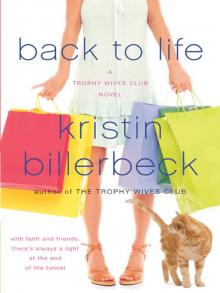 Back to Life
Back to Life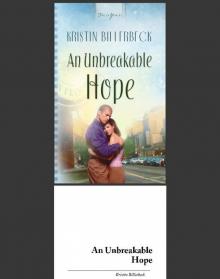 Unbreakable Hope
Unbreakable Hope The Scent of Rain
The Scent of Rain She's Out of Control
She's Out of Control She's All That
She's All That A Billion Reasons Why
A Billion Reasons Why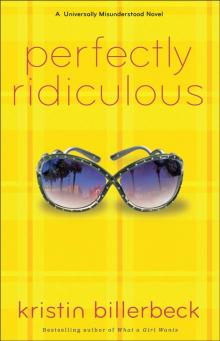 Perfectly Ridiculous
Perfectly Ridiculous Split Ends
Split Ends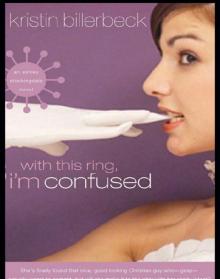 With This Ring, I'm Confused
With This Ring, I'm Confused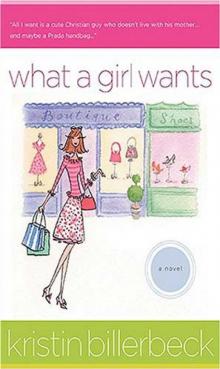 What a Girl Wants
What a Girl Wants The Valiant Hearts Romance Collection
The Valiant Hearts Romance Collection Perfectly Dateless
Perfectly Dateless Calm, Cool, and Adjusted
Calm, Cool, and Adjusted The Theory of Happily Ever After
The Theory of Happily Ever After A Girl's Best Friend
A Girl's Best Friend